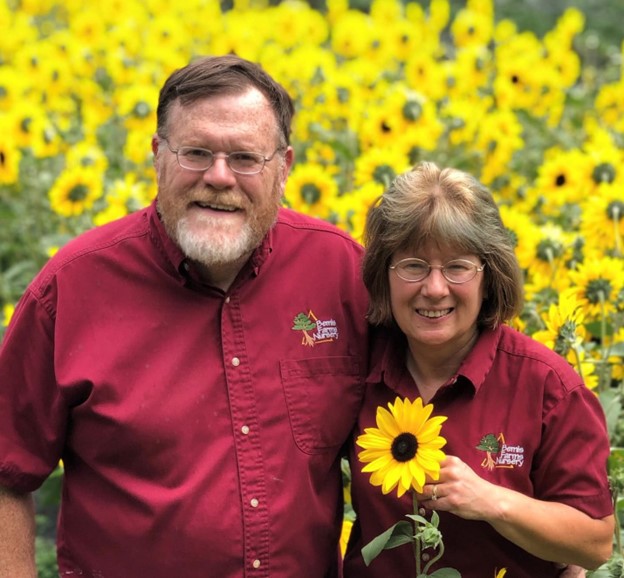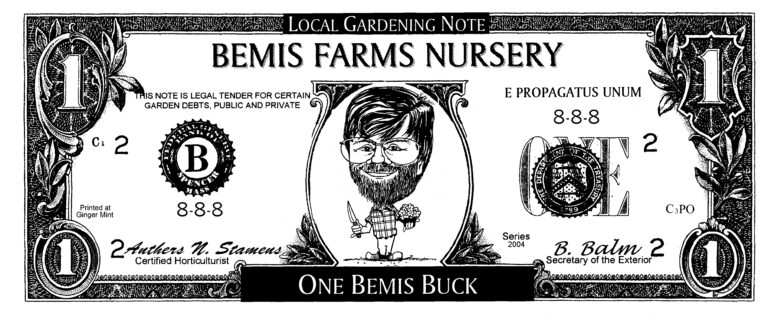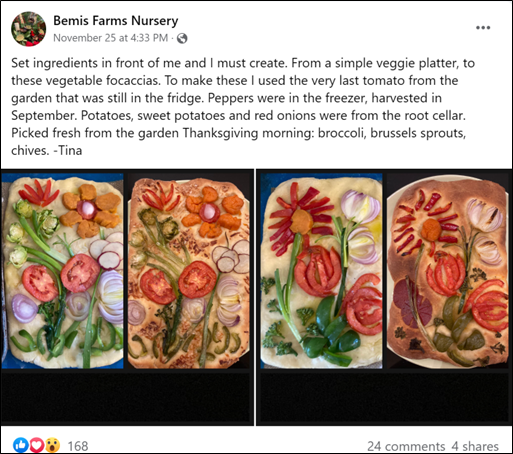“The moment I decided to hold workshops, I knew there was a major shift in the universe. I didn’t know what it was at the time, but I knew it was big.” –Tina Bemis, Bemis Farms Nursery, Spencer, MA

Ed and Tina Bemis, co-owners, Bemis Farms Nursery, Spencer, Massachusetts.
From 1 workshop to 450 classes a year
Ed and Tina Bemis are the co-owners of Bemis Farms Nursery, a midsize, independent, family-run garden center, farm, nursery, and greenhouse founded by Ed’s father and grandfather in 1947. Bemis Farms grows virtually all the perennials and 75 percent of the annuals and herbs they sell; they buy half of the vegetable transplants and most of the trees and shrubs in their inventory from local sources.
Bemis Farms Nursery uses a variety of marketing tactics, but offering workshops has been the cornerstone of their success. Tina led their first workshop—a wreath-making class–back in 1996. They now run 450 classes a year; topics include container gardening, garden-related crafts, and other agriculture-related activities. Bemis Farms offers public and private workshops at the farm or at local senior centers, garden clubs, and businesses.
“Holding workshops is what we’re known for now, is what pays the bills, and allows me to keep my staff mostly year-round instead of having them laid off for three months a year,” Tina says. “The workshops position us as the likable, relatable experts in our market. After taking a class, people know and trust us to provide the best plants and the best advice they can get. We often have someone take a few classes, then come back to buy a whole landscape.”
Tina prices the workshops based on their perceived value, not direct costs. While not every class generates a profit, they all contribute to making the business profitable. “We use up every single plant, berry, cone, twig, dried flower that we grow on our farm and somehow repurpose it in a workshop. Other farms may have to attribute 2-5 percent of sales to scrap, but we have virtually no leftover inventory to write off,” Tina says.
A customer loyalty program: Bemis Bucks

Workshops are just one of Bemis Farms’ innovative marketing
tactics. They also offer a customer loyalty program called Bemis Bucks. It’s
all analog; no app or digital accounts are required. Customers receive one
printed “Bemis Buck” for every $10 spent in the spring, which can be redeemed
for up to 50 percent off any purchase during a five-day window in July.
While the Bemis Buck program is both popular and profitable,
the Bemises don’t recommend it for everyone. “It took 30 years of trial and
error to perfect this strategy,” Tina explains. They grow perennials that will
be in peak bloom during those five days of the event. The plants, which are
intentionally grown for this promotion, sell at a higher-than-normal price
early in the season and go out the door in July at a discount. The Bemis Bucks
program generates foot traffic in mid-summer, a notoriously slow time in the
nursery industry.
How Bemis Farms Nursery uses Facebook

Bemis Farms Nursery has 10,000 Facebook followers; typical posts get anywhere from a few dozen to a couple of hundred likes, comments, and shares.
Tina sees Facebook as a tool to reinforce their brand, not a way to generate sales. “When I teach a class, I ask who is new and how they found out about it. Rarely is it from Facebook,” she says.
She doesn’t do much active selling on Facebook. “Only about eight of our posts a year directly ask people to sign up for an event. I do post photos of people taking classes.” Post from classes get a lot of shares because people love to see themselves and show off their work.
Tina prefers to post gardening tips, stories, and photos of their products and events. She hates scheduling posts in advance. She’s wont to wander around the nursery and spontaneously create a post, such as “LOOK! The first pansy opened today!” Or “The shipment of Geek Plants just pulled in from Pennsylvania. There are only 10 Velvet Elvis plants, so hurry in if you want one.”
She rarely advertises on Facebook. “I used to advertise posts more often, but now I only pay about four times a year.”
Other marketing tactics and measurement
Bemis Farms Nursery has two interconnected websites, one that focuses on the nursery and an ecommerce site that primarily promotes the events. Their email newsletter, which is Ed’s domain, has around 15,000 subscribers. They used to send a newsletter every week or two in season, but now it goes out about 15 times a year. In addition, they send a direct mail flyer to their customers 4 – 5 times a year.
Ed and Tina do relatively little tracking or measurement to determine which of their marketing tactics are generating sales, since they believe that if you offer great advice and a great experience, your customers will stay loyal.
They do schedule their direct mail flyers, emails, and Facebook posts about the workshops on different days to see if any of these tactics generates an uptick in workshop registration or sales. “The tactics do overlap, so it’s hard to say which is the most effective, but our direct mail piece seems to get the most results,” Tina says. She speculates that direct mail works “Because it doesn’t get buried. Facebook is fleeting, and emails get buried. But the color flyer stays on your kitchen table until you do something with it.”
In an ideal world, Ed and Tina say they would keep better tabs on their marketing metrics, but over the years, they’ve found a winning combination of tactics that works for them.
